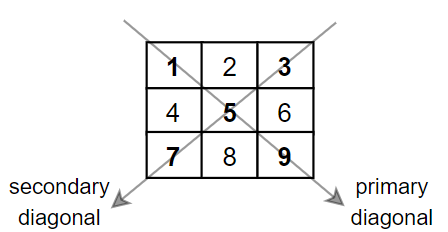the first one in Biweekly Contest 34.
Difficulty : Easy
Related Topics : Array
Given a square matrix
mat, return the sum of the matrix diagonals.Only include the sum of all the elements on the primary diagonal and all the elements on the secondary diagonal that are not part of the primary diagonal.
Input: mat = [[1,2,3], [4,5,6], [7,8,9]] Output: 25 Explanation: Diagonals sum: 1 + 5 + 9 + 3 + 7 = 25 Notice that element mat[1][1] = 5 is counted only once.Input: mat = [[1,1,1,1], [1,1,1,1], [1,1,1,1], [1,1,1,1]] Output: 8Input: mat = [[5]] Output: 5
n == mat.length == mat[i].length1 <= n <= 1001 <= mat[i][j] <= 100
- mine
- Java
Runtime: 0 ms, faster than 100.00%, Memory Usage: 39.1 MB, less than 100.00% of Java online submissions//O(N)time //O(1)space public int diagonalSum(int[][] mat) { int r = mat.length; if(r == 1) return mat[0][0]; int s = 0, e = r - 1; int x = 0; int res = 0; while(x < r){ res += mat[x][s] + mat[x][e]; x++; s++; e--; } if(r % 2 != 0){ res -= mat[r / 2][r / 2]; } return res; }
- Java
